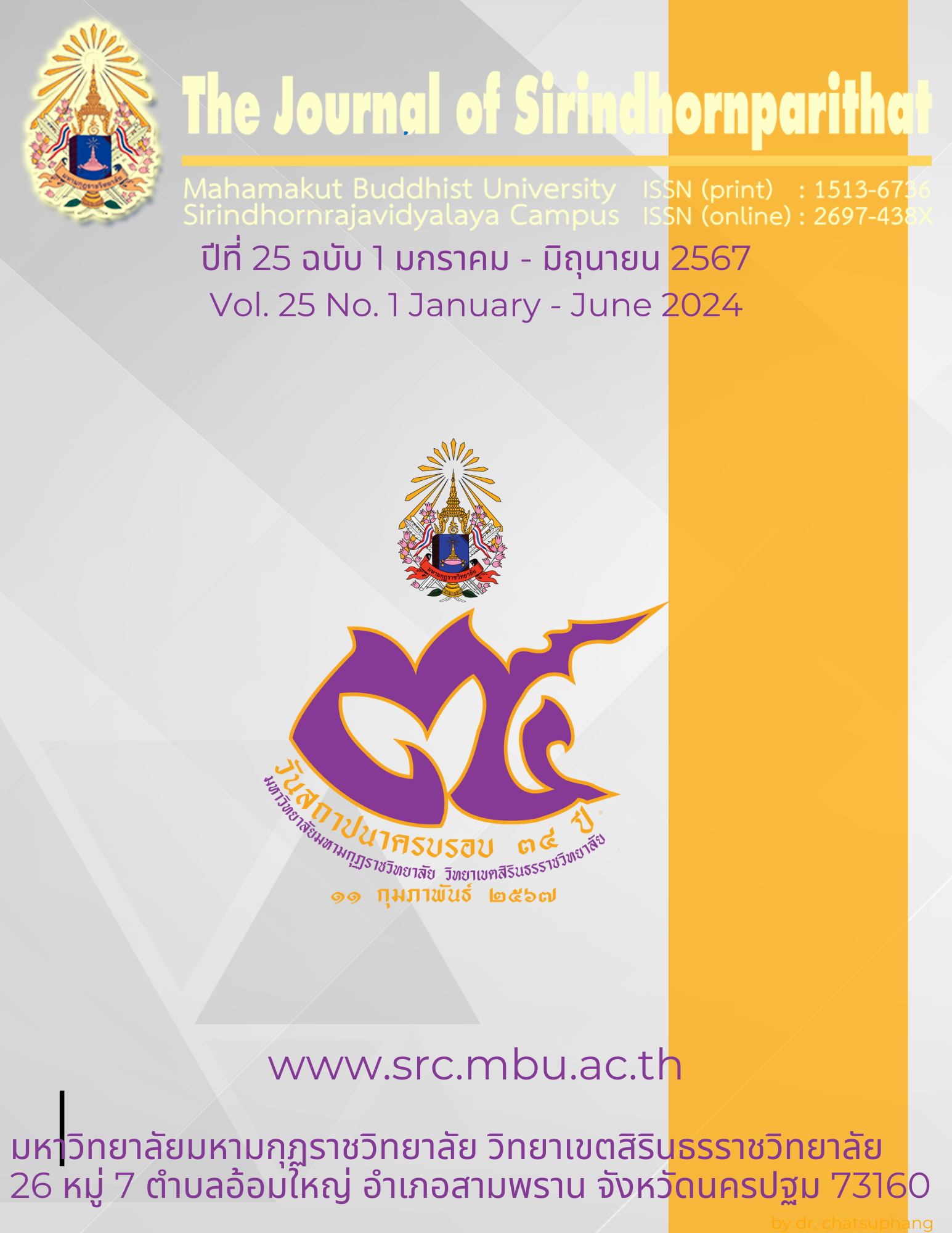The project management for the development of student morality and ethics according to the national strategy using the CIPP Model at primary schools in the western region of Thailand
Keywords:
project management, student morality, primary schoolsAbstract
The purposes of this research were to 1) Study project management for the development of student morality and ethics according to the national strategy using the CIPP Model of primary schools in the western region of Thailand, 2) Compare project management for the development of student morality and ethics according to the national strategy using the CIPP Model of primary schools in the western region of Thailand.
The samples were 300 teachers. The research instrument was a questionnaire. It has validity between .76-1.0 and reliability has .945 The statistics used for analysis were frequency, percentage, mean, standard deviation, ONE-WAY ANOVA, Test the difference with F-test. When differences are found make double comparisons with Scheffe'.
The research findings were as follows:
- The project management for the development of student morality and ethics according to the national strategy using the CIPP Model of primary schools in the western region of Thailand. They were overall at a high level. When classified, it was found to be at a high level in 4 aspects, arranged in order of the highest to lowest average values is the context of the school, Inputs, Process, and product.
2. The project management for the development of student morality and ethics according to the national strategy using the CIPP Model of primary schools in the western region of Thailand. The group 1, group 2 and group 3 were different and significant at the .001 and check was performed with a Scheffe'. Results found the project management for the development of student morality and ethics according to the national strategy using the CIPP Model of primary schools in the western region of Thailand. Group 1 and Group 2 were not different, Group 2 and Group 3 were not different but Group 1 and Group 3 were different and significant at the .001.
References
ฉวีวรรณ หอธรรมกุล. (2564). การประเมินโครงการเสริมสร้างคุณธรรม จริยธรรมและธรรมาภิบาลในสถานศึกษา (โรงเรียนสุจริต) สำนักงานเขตพื้นที่การศึกษาประถมศึกษาประจวบคีรีขันธ์ เขต 2. ประจวบคีรีขันธ์ : สำนักงานเขตพื้นที่การศึกษาประถมศึกษาประจวบคีรีขันธ์ เขต 2.
ณฐมน อนันต์. (2564). การประเมินโครงการคุณธรรมในโรงเรียนคุณธรรม สพฐ. ตามหลักอิทธิบาท 4 ของโรงเรียนในสังกัดสำนักงานเขตพื้นที่การศึกษามัธยมศึกษานครสวรรค์. วิทยานิพนธ์หลักสูตรปริญญาครุศาสตรมหาบัณฑิต สาขาวิชาพุทธบริหารการศึกษา บัณฑิตวิทยาลัย มหาวิทยาลัยมหาจุฬาลงกรณราชวิทยาลัย
ธีรวุฒิ เอกะกุล. (2553). ระเบียบวิธีวิจัยทางพฤติกรรมศาสตร์และสังคมศาสตร์. อุบลราชธานี: มหาวิทยาลัยราชภัฏอุบลราชธานี.
ยุพิน รอดประพันธ์. (2561). โครงการโรงเรียนคุณธรรมโดยประยุกต์ใช้รูปแบบการประเมินซิป (CIPP Model) โรงเรียนวัดห้วยธารทหาร สำนักงานเขตพื้นที่การศึกษาประถมศึกษานครสวรรค์ เขต 3. นครสวรรค์ : สำนักงานเขตพื้นที่การศึกษาประถมศึกษานครสวรรค์ เขต 3.
ศิลชัย ถาวร. (2565). การประเมินโครงการพัฒนาคุณธรรมจริยธรรม ของโรงเรียนรัตนโกสินทร์สมโภชบวรนิเวศศาลายา ในพระสังฆราชูปถัมภ์. การค้นคว้าอิสระหลักสูตรศึกษาศาสตรมหาบัณฑิต สาขาวิชาการบริหารการศึกษา ภาควิชาการบริหารการศึกษา บัณฑิตวิทยาลัยมหาวิทยาลัยศิลปากร.
สำนักนายกรัฐมนตรี. (2559). แผนพัฒนาเศรษฐกิจและสังคมแห่งชาติ ฉบับที่ 12 (พ.ศ. 2560–2565). กรุงเทพมหานคร: สำนักงานคณะกรรมการพัฒนาการเศรษฐกิจและสังคมแห่งชาติ.
Cochran, W.G. (1977). Sampling Techniques. 3rd ed. New York: John Wiley and Sons Inc.
Cronbach, Lee. J. (1990). Essentials of Psychology Testing. 5th ed. New York: HarperCollins Publishers Inc.
Stufflebeam, Daniel L. (1971). The Relevance of the CIPP Evaluation Model for Educational Accountability. Atlantic City, N.J.

Downloads
Published
Issue
Section
License
Copyright (c) 2024 Mahamakut Buddhist University

This work is licensed under a Creative Commons Attribution-NonCommercial-NoDerivatives 4.0 International License.
บทความที่ได้รับการตีพิมพ์เป็นลิขสิทธิ์ของ มหาวิทยาลัยมหามกุฏราชวิทยาลัย วิทยาเขตสิรินธรราชวิทยาลัย
ข้อความที่ปรากฏในบทความแต่ละเรื่องในวารสารวิชาการเล่มนี้เป็นความคิดเห็นส่วนตัวของผู้เขียนแต่ละท่านไม่เกี่ยวข้องกับหาวิทยาลัยมหามกุฏราชวิทยาลัย วิทยาเขตสิรินธรราชวิทยาลัย และคณาจารย์ท่านอื่นๆในมหาวิทยาลัยฯ แต่อย่างใด ความรับผิดชอบองค์ประกอบทั้งหมดของบทความแต่ละเรื่องเป็นของผู้เขียนแต่ละท่าน หากมีความผิดพลาดใดๆ ผู้เขียนแต่ละท่านจะรับผิดชอบบทความของตนเองแต่ผู้เดียว



